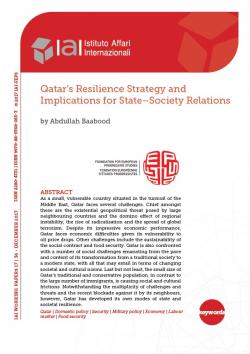Qatar's Resilience Strategy and Implications for State-Society Relations
As a small, vulnerable country situated in the turmoil of the Middle East, Qatar faces several challenges. Chief amongst these are the existential geopolitical threat posed by large neighbouring countries and the domino effect of regional instability, the rise of radicalization and the spread of global terrorism. Despite its impressive economic performance, Qatar faces economic difficulties given its vulnerability to oil price drops. Other challenges include the sustainability of the social contract and food security. Qatar is also confronted with a number of social challenges emanating from the pace and content of its transformation from a traditional society to a modern state, with all that may entail in terms of changing societal and cultural norms. Last but not least, the small size of Qatar’s traditional and conservative population, in contrast to the large number of immigrants, is causing social and cultural frictions. Notwithstanding the multiplicity of challenges and threats and the recent blockade against it by its neighbours, however, Qatar has developed its own modes of state and societal resilience.
Paper produced in the framework of a project entitled “The EU’s New Resilience Agenda in the MENA Region”, December 2017
-
Details
Roma, IAI, December 2017, 27 p. -
Issue
17|36 -
ISBN/ISSN/DOI:
978-88-9368-065-3
Introduction
1. Existential threats
1.1 Protecting the small state
1.2 Mediation and branding as a form of state resilience in Qatar
1.3 Cultural and sports diplomacy
1.4 Defence agreements and foreign military bases in Qatar
2. Economic challenges
2.1 The Qatari State’s economic resilience
2.2 Qatar’s economic diversification
2.3 Sovereign wealth funds
3. Socio-political structures, demography and the labour market
3.1 Qatar’s societal resilience
3.2 Public vs. private sector employment
3.3 Tradition vs. modernization
4. Food security
4.1 Resilience and food security
Conclusion
References
Topic
Tag
Related content
-
Publication16/02/2018
The EU, Resilience and the MENA Region
leggi tutto -
Ricerca30/10/2017
The EU’s New Resilience Agenda in the MENA Region
leggi tutto



